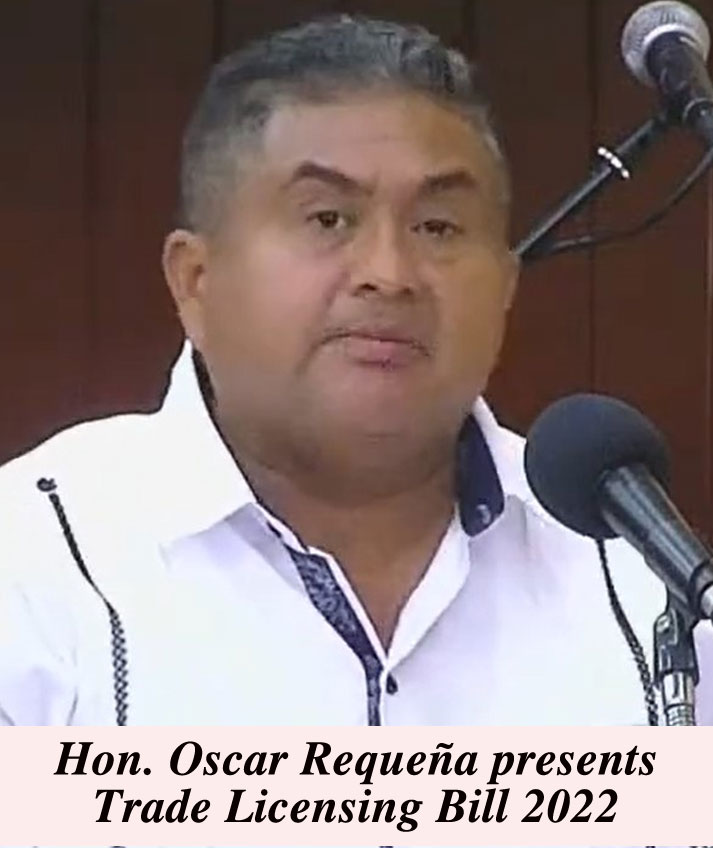BELIZE CITY, Mon. May 16, 2022
The Trade Licensing Bill 2022, which was introduced during a sitting of the House of Representatives on Friday, received widespread backlash over the weekend—so much so that it prompted the Government of Belize to issue a statement clarifying the terms of the bill.
The Minister with responsibility for Labour and Local Government, Hon. Oscar Requeña, rose to present the bill on Friday:
“Chapter 66 of the Laws of Belize makes provisions for the requirement for anyone intending to carry out a trade or sale of goods or services in a municipality, town, city in Belize to apply for a license at the locally appointed trade licensing board to conduct such trade,” said Hon. Requeña.
The new bill expands the current trade licensing requirements to include a wider range of business persons and entrepreneurs, including entertainers, e-business operators, and peddlers. The bill was not received well by most Belizeans, however, with many saying that they felt the fees outlined in the bill that would be required to obtain a trade license would put an even greater strain on businesses already struggling to make ends meet. Many Belizeans particularly criticized the proposed Schedule 7 of the Trade Licensing Act, which lists the classes of business that are required to apply for trade licensing and the maximum fee that would be paid by them.
In response, the Ministry of Labour stated in a press release issued on Saturday that it found it necessary to make a statement of clarification “as a consequence of erroneous and misleading mainstream and social media representation”.
In that statement, the Ministry said that the repeal and replacement of the Trade Licensing Act is a part of a process that has been ongoing since 2014 and has included “extensive consultation with private and public sector stakeholders across the entire country.”
It added that the bill does not place any licensing requirements or fees on street or roadside vendors, as many persons had been claiming, and that the bill only considers those whose establishments have a “productive footprint of 600 or more square footage.”
The Ministry also clarified that the fees shown in the proposed Schedule 7 of the Trade Licensing Act only outline the maximum fees that could be charged.
It also noted that the new proposals aim to establish trade licensing fees for license holders for a definitive 3-year period.
“This eliminates the requirement for the local authority to conduct annual assessments for established and licensed businesses as well as provides certainty and stability for business owners,” it stated.
“The ministry underscores that the bill was tabled for its first reading only and has been referred to the Political and Constitutional Reform Committee for its consideration. The ministry further encourages all interested parties to make representation to the House Committee at its sitting when announced by the National Assembly,” the release concluded.
Nevertheless, the Ministry’s press release did not deter local artists, entrepreneurs, and small business owners from continuing to voice their opposition.
Also weighing in on the matter was Minister of Education, Culture, Science and Technology, Hon. Francis Fonseca, who clarified that while the bill was introduced at Friday’s sitting, it has not yet been made into law.
“All concerns and queries now being expressed regarding the Bill will be taken into account and duly considered before the Bill is returned to the House for its 2nd and 3rd readings. The Minister has already indicated that certain changes will be necessary,” he stated.
Hon. Fonseca noted that as the Minister of Culture, he acknowledges the concerns being raised by artists and entertainers, especially considering the current economic climate. But he also stated that the Bill aims to establish “sustainable economic development” within the country.
“To achieve this requires a properly structured economy which protects and respects legitimate investments and generates fair, reasonable revenues for the government. We cannot have an economy in which 50% of the participants follow the rules, register their businesses and pay license fees while the other 50% operate completely outside of the formal economy while remaining in direct competition to the first 50%,” he said.
Once the bill is made law, it is not expected to come into effect until January 2023.

